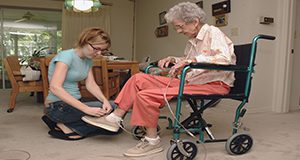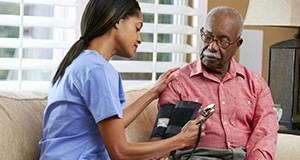Do you think your blood pressure may be too high? Have you been diagnosed with high blood pressure? In either case, it is recommended that you monitor your blood pressure at home and get it checked at the doctor's office. This 4-page document discusses how to monitor your blood pressure at home. Written by Linda B. Bobroff, and published by the UF/IFAS Department of Family, Youth and Community Sciences, revised November 2018.
http://edis.ifas.ufl.edu/fy1126
Tag: Healthy Living for Elders series
Healthy Living: Taking Care from Head to Toe
If you have diabetes, pay special attention to your skin, eyes, teeth, gums, and feet. These areas are at high risk for complications. This 3-page fact sheet is a major revision that gives helpful information on ways to take care of these areas to reduce the risk of diabetes-related complications. Written by Linda B. Bobroff, and published by the UF Department of Family, Youth and Community Sciences, revised May 2016.
http://edis.ifas.ufl.edu/fy886
Healthy Living: Diabetes
Diabetes is a serious health condition that occurs when a person’s body has difficulty making or using insulin, which results in high blood glucose (blood sugar) and can lead to other complications. This 3-page facts sheet covers the effects of high blood glucose, who is at risk, the symptoms and management of the condition, and additional resources for those with or at risk of developing diabetes. Written by Linda B. Bobroff, Karla P. Shelnutt, and Paulina Wittkowsky, and published by the UF Department of Family Youth and Community Sciences, June 2015.
http://edis.ifas.ufl.edu/fy078
Healthy Living: Checking Blood Glucose
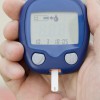 Checking your blood glucose levels is an important part of managing diabetes. Your blood glucose values let you know how well your care plan is working and if you need to make any changes. This 3-page fact sheet was written by Jennifer Hillan and Linda B. Bobroff, and published by the UF Department of Family Youth and Community Sciences, February 2015.(Photo iStock/Thinkstock.com)
Checking your blood glucose levels is an important part of managing diabetes. Your blood glucose values let you know how well your care plan is working and if you need to make any changes. This 3-page fact sheet was written by Jennifer Hillan and Linda B. Bobroff, and published by the UF Department of Family Youth and Community Sciences, February 2015.(Photo iStock/Thinkstock.com)
http://edis.ifas.ufl.edu/fy868
Healthy Living for Elders: Use Your Medicines Safely!
 Medicines can help us feel better and improve our health, but if we do not use them correctly, they can make us feel worse or even cause major health problems. To use your medicines safely, keep the following tips in mind. This 4-page large print fact sheet was written by Paulina Wittkowsky, Linda B. Bobroff, and Emily Minton, and published by the UF Department of Family Youth and Community Sciences, November 2014. (Photo: Thinkstock.com)
Medicines can help us feel better and improve our health, but if we do not use them correctly, they can make us feel worse or even cause major health problems. To use your medicines safely, keep the following tips in mind. This 4-page large print fact sheet was written by Paulina Wittkowsky, Linda B. Bobroff, and Emily Minton, and published by the UF Department of Family Youth and Community Sciences, November 2014. (Photo: Thinkstock.com)
http://edis.ifas.ufl.edu/fy667
Healthy Living: Diabetes Warning Signs
 Could you have diabetes and not know it? It is possible. More than one-fourth of the people who have diabetes don’t know they have the disease! Treating and managing diabetes greatly decreases the risk of diabetes-related health problems. Review the list of warning signs below and check any that you have experienced. This 2-page fact sheet was written by Linda B. Bobroff, and published by the UF Department of Family Youth and Community Sciences, July 2014.
Could you have diabetes and not know it? It is possible. More than one-fourth of the people who have diabetes don’t know they have the disease! Treating and managing diabetes greatly decreases the risk of diabetes-related health problems. Review the list of warning signs below and check any that you have experienced. This 2-page fact sheet was written by Linda B. Bobroff, and published by the UF Department of Family Youth and Community Sciences, July 2014.
http://edis.ifas.ufl.edu/fy084
Healthy Living: Food Can Affect Your Medicines
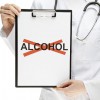 Do the foods you eat affect the way your medicines work? It’s very possible. Certain foods can affect the way prescription and over-the-counter medicines work by delaying, decreasing, or enhancing how much of the drug is absorbed by the body. This can cause unwanted and harmful side effects. Follow the information in this 2-page fact sheet to reduce your risk of common food and drug interactions. Written by Paulina Wittkowsky and Linda B. Bobroff, and published by the UF Department of Family Youth and Community Sciences, May 2014.
Do the foods you eat affect the way your medicines work? It’s very possible. Certain foods can affect the way prescription and over-the-counter medicines work by delaying, decreasing, or enhancing how much of the drug is absorbed by the body. This can cause unwanted and harmful side effects. Follow the information in this 2-page fact sheet to reduce your risk of common food and drug interactions. Written by Paulina Wittkowsky and Linda B. Bobroff, and published by the UF Department of Family Youth and Community Sciences, May 2014.
http://edis.ifas.ufl.edu/fy676
Healthy Living: Keep Track of Your Blood Pressure
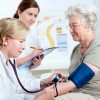 Every time you take your blood pressure, write down the date and time, the blood pressure measurement, and where it was taken (home, doctor’s office, etc.). Not only that, but include any comments your health care provider made and anything you would like to note, such as how you feel or medications you recently started or stopped. This 2-page fact sheet was written by Linda B. Bobroff and Leigh Ann Martin, and published by the UF Department of Family Youth and Community Sciences, October 2013.
Every time you take your blood pressure, write down the date and time, the blood pressure measurement, and where it was taken (home, doctor’s office, etc.). Not only that, but include any comments your health care provider made and anything you would like to note, such as how you feel or medications you recently started or stopped. This 2-page fact sheet was written by Linda B. Bobroff and Leigh Ann Martin, and published by the UF Department of Family Youth and Community Sciences, October 2013.
http://edis.ifas.ufl.edu/fy662
Healthy Living: Tips for Staying Regular (FCS8565/FY072)
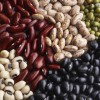 Constipation means having a bowel movement fewer than three times a week. Stools are usually hard and can be painful to pass. Constipation is common among older adults.This 1-page fact sheet was written by Linda B. Bobroff, and published by the UF Department of Family Youth and Community Sciences, January 2013.
Constipation means having a bowel movement fewer than three times a week. Stools are usually hard and can be painful to pass. Constipation is common among older adults.This 1-page fact sheet was written by Linda B. Bobroff, and published by the UF Department of Family Youth and Community Sciences, January 2013.
http://edis.ifas.ufl.edu/fy072
Healthy Living: Scrambling for a Variety of Foods (FCS8615/FY672)
Unscramble the words to spell some of the foods that are wise choices for good health. Then write down each of the numbered letters on the blanks below to figure out the message. This 1-page fact sheet was written by Linda B. Bobroff, and published by the UF Department of Family Youth and Community Sciences, January 2012.
http://edis.ifas.ufl.edu/fy672
Healthy Living: Diabetes Care during Sick Days (FCS8819/FY884)
 When you are sick, your blood glucose levels are harder to regulate. Being sick often causes blood glucose levels to rise which can lead to serious health conditions. It’s important to have a plan on how to manage your sick days so you are prepared ahead of time. Read this 2-page fact sheet to learn more! Written by Jennifer Hillan and Emily Minton and published by the UF Department of Family Youth and Community Sciences, August 2011. (Public domain photo by Stickpen)
When you are sick, your blood glucose levels are harder to regulate. Being sick often causes blood glucose levels to rise which can lead to serious health conditions. It’s important to have a plan on how to manage your sick days so you are prepared ahead of time. Read this 2-page fact sheet to learn more! Written by Jennifer Hillan and Emily Minton and published by the UF Department of Family Youth and Community Sciences, August 2011. (Public domain photo by Stickpen)
http://edis.ifas.ufl.edu/fy884
Healthy Living: Staying Regular (FCS8570/FY063)
Having a bowel movement fewer than three times a week is defined as constipation. This condition is very common in persons over age 65. Over time, chronic constipation can cause serious and painful conditions such as hemorrhoids and diverticular disease. This 2-page fact sheet describes the causes, prevention, and high fiber foods. Written by Linda B. Bobroff and Luisa Oliver-Cordero and published by the UF Department of Family Youth and Community Sciences, December 2011.
http://edis.ifas.ufl.edu/fy063
Healthy Eating: Folate (FCS8567/FY066)
Folate is one of the B vitamins. It is involved in the formation of DNA and amino acids. DNA is the genetic material found in all cells of your body. Amino acids are the building blocks of proteins. Learn more about this important vitamins in this 2-page fact sheet was written by Linda B. Bobroff, and published by the UF Department of Family Youth and Community Sciences, December 2010.
http://edis.ifas.ufl.edu/fy066
Healthy Living: Diabetes (FCS8574/FY078)
Diabetes is a condition in which the body has difficulty making or using insulin. This 3-page fact sheet answers basic questions about diabetes, and was written by Linda B. Bobroff, Karla P. Shelnutt, and Paulina Wittkowsky, and published by the UF Department of Family Youth and Community Sciences, March 2011.
http://edis.ifas.ufl.edu/fy078
Healthy Living: Exercise and Diabetes (FCS8613/FY669)
Staying active is one of the best things you can do for your health. Regular physical activity can help you control your blood glucose levels, reduce body fat, and decrease your risk of heart disease. Staying active also can help you sleep better, improve posture and balance, maintain independent living, and improve quality of life. Here are some tips to help you create a fun and healthy exercise program. Start today! This 2-page fact sheet was written by Sergio Romero and Linda B. Bobroff, and published by the UF Department of Family Youth and Community Sciences, February 2011.
http://edis.ifas.ufl.edu/fy669
Healthy Living: Taking Care from Head to Toe (FCS8821/FY886)
If you have diabetes, pay special attention to your skin, eyes, teeth, gums, and feet. These areas are at increased risk for complications due to your diabetes. Read this 2-page fact sheet to learn how you can take care of your body from head to toe!
Written by Jennifer Hillan and Emily Minton, and published by the UF Department of Family Youth and Community Sciences, February 2011.
http://edis.ifas.ufl.edu/fy886
Healthy Living: Scrambling for a Variety of Foods (FCS8615/FY672)
Unscramble the words to spell some of the foods that are wise choices for good health. Then write down each of the numbered letters on the blanks to figure out the message! This 1-page handout was written by Linda B. Bobroff, and published by the UF Department of Family Youth and Community Sciences, December 2010.
http://edis.ifas.ufl.edu/fy672
Revised Healthy Living, Vida Saludable, and Alimentacion Saludable series publications
Healthy Living (1-page fact sheets)
Are You At Risk for Diabetes? (FCS8573/FY076)
http://edis.ifas.ufl.edu/fy076
Food Can Affect Your Medicines (FCS8622ENG/FY676)
http://edis.ifas.ufl.edu/fy676
Vida Saludable
Sitios web confiables (FCS8587SPAN/FY103)
http://edis.ifas.ufl.edu/fy103
¡Use sus medicinas de una manera segura! (FCS8594Span/FY668)
http://edis.ifas.ufl.edu/fy668
Los alimentos pueden afectar sus medicinas (FCS8622SPAN/FY677)
http://edis.ifas.ufl.edu/fy677
Alimentación Saludable
Nutrición y diabetes (FCS8612SPAN/FY665)
http://edis.ifas.ufl.edu/fy665
Líquidos (FCS8569SPAN/FY071)
http://edis.ifas.ufl.edu/fy071
FCS8547/HE944 Healthy Living: Determine Your Nutritional Health
FCS8547, a 4-page fact sheet by Linda B.Bobroff, provides a checklist to determine whether an older person is at nutritional risk and additional information about warning signs of poor nutritonal health. Published by the UF Department of Family Youth and Community Sciences, November 2010.
http://edis.ifas.ufl.edu/he944
FCS8576/FY082 Healthy Living: Diabetes Resources
Revised! FCS8576, a 1-page fact sheet by Linda Bobroff and Paulina Wittkowski, lists contact information for diabetes information and referral sources. Published by the UF Department of Family Youth and Community Sciences, November 2010.
http://edis.ifas.ufl.edu/fy082

